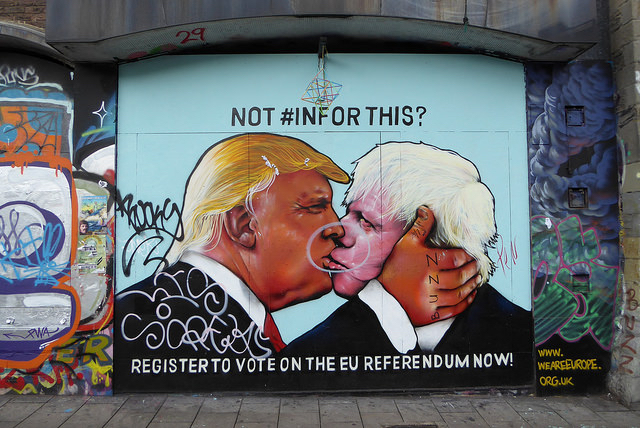The outcome of the Brexit vote has knocked politics in the UK into a cocked hat. David Cameron, whose ill-conceived attempt to resolve a split in his own party gave rise to the whole affair, has resigned, content to let an unlucky successor preside over the putrid remains of conservative politics.
The Labour Party also seems to be in crisis, although what Corbyn could have done differently in the current situation is anyone’s guess. Meanwhile, the shadow of unrestrained xenophobia spreads across the land, as departure from the EU was related to what bigots in the UK think of as the problem of immigration.
The outcome of the vote has also revealed some interesting fault-lines in what one now has real difficulty referring to as the United Kingdom. The vote divided heavily along age lines. Pensioners voted for the Brexit at a rate of nearly 60%, while among those aged 18 to 24 only 19% favored leaving. As usual, people in the former category were politically overrepresented, having the free time to get out and vote at a higher rate, but apparently not the time to think clearly about the actual consequences of their vote.
There was also a strong regional component, with the vote to leave strongest in the northern rust belt regions and, for reasons that are difficult to parse, Wales. London voted strongly against, which is not surprising given the volume of financial business that is likely to decamp from the City to Frankfurt if Article 50 of the Lisbon Treaty is triggered. Scotland also voted heavily against the Brexit, although the point is probably moot given that departure from the EU is almost certain to lead to another referendum on Scottish independence which, in turn, is almost certain to succeed.
Northern Ireland rejected the Brexit and the reasons why are not far to seek. The period since the Good Friday Agreement has seen a strengthening of cross-border economic ties between Northern Ireland and the Republic. Economic development has gone hand in hand with the deepening of the peace process and drawn a lot of the venom from the vicious sectarianism that drove three decades of brutal conflict in the region.
The return of the hard border between Northern Ireland and the Republic is unlikely to result directly in a return to the bad old days. But it could easily have consequences that might contribute to a re-emergence of some degree of sectarian conflict. The clarity with which many in Northern Ireland recognize this could be seen during the European Cup match between Northern Ireland and Wales on Saturday, when Northern Ireland fans taunted their Welsh opponents by singing, “We voted remain, we voted remain, we’re not stupid, we voted remain!”
Donald Trump was in Scotland on the day that the result was announced, shilling for his golf course projects, which are the kind of thing that make most Scots wish for immigration controls, at least of a certain kind. Trump praised the result as a moment in which the British “took their country back.” Given Mr. Trump’s tenuous grasp on the real, it was hardly surprising that he signally failed to understand which country had been taken back, and by whom. The Scots’ response was quick in coming via social media. One doesn’t need to hear a selection of the tweets read by Scottish actor David Tennant to get the gist, but it does add a certain Caledonian je ne sais quoi.

There is a lot of talk these days, some of it quite alarmist, about the homologies between the Brexit campaign and the rise of Trumpism in the United States. There are of course certain similarities. These include explicit and unapologetic racism, the big lie (sadly exiting the EU will not result in £345 million a week being invested in the NHS,) and the view that since the situation is bad, any kind of change must be for the better. Nigel Farage, the leader of the UK Independence Party (UKIP) and one of the prime movers of the exit campaign, is who Donald Trump would be if he was marinated in smarm for six months, and was aptly characterized by John Oliver as, “a three time cover model for Punchable Face magazine,” which also suits Trump to a “t”.
Both Trump and Farage arose as the result of miscalculations on the part of a major conservative political party. Cameron thought (or seems to have thought) that he could play the brinksman, thereby keeping the Euroskeptic factions in his party onside. But he who plays with thistles should expect to get stung, and when one’s political program is predicated on harnessing the worst, most xenophobic impulses of the petit-bourgeoisie, one should not be at all surprised when the whole thing goes sideways. Trump too, as a phenomenon, is a result of the Republican strategy of courting whites (predominantly poorer ones) with nudge-and-a-wink racism and blustering national chauvinism.
But just because two horrible things have some similarities doesn’t make one the harbinger for the other. In the first instance, all miscalculations are not created equal. In the case of the (for the moment) United Kingdom, the issue at hand was whether to maintain connection to a supranational political entity that does, in fact, have fairly severe democratic deficits.
Both the EU and the UK have vexing problems, but there is simply no reason to believe that those problems will be any closer to solution with Britain outside the EU than in it. The most catastrophic of Cameron’s tactical mistakes was his failure to recognize the short term synergistic possibilities of extreme nationalism and mendacious cynicism.
Did the dangers associated with this occur to Cameron when a member of the British parliament was assassinated in her home constituency by a man who shouted “Britain first!” as he murdered her? If so, he gave no outward sign. Yet, Cameron bears indirect responsibility for the killing, together with Nigel Farage.
Donald Trump’s political campaign has, as noted above, many similarities: screeching nationalism, the assertion of things that are demonstrably false, and the underlying theme that some past greatness might be recreated if only it weren’t for the malign influence of…take your pick: the Chinese, the Democrats, illegal immigrants, women, etc. But Trump the politician has a more difficult row to hoe for a number of reasons.

There is a lot to be said of a critical nature about Hillary Rodham Clinton, but there is no denying that she is an articulate politician with political and economic ideas that are unlikely to cause the Republic (or the world economy) to collapse in the short term. Unlike the EU, there are a fairly large number of people who actually feel quite positively inclined toward her.
There is also the matter of the degree to which, unlike Boris Johnson for instance, Trump is out of step with the leadership of his party and the infrastructure it controls. Trump’s rejection of unrestrained free trade runs counter to decades of orthodoxy of both of the major American political parties.
While he has made some moves to court evangelicals (a group with much less pronounced influence in the UK), Trump simply doesn’t come off as the kind of guy who is going to start the day with a Bible verse or to spend a lot of political capital closing abortion clinics (although given his propensity for waffling it’s hard to know what he’d do on any given day). As a result there is a large element of his home constituency that he has a hard time motivating, but he also has a hard time speaking the language that the heavily evangelical leadership of the Republican Party likes to hear.
Unlike the Brexit referendum, the US presidential process is long and drawn out. Trump’s main campaigning asset, his failure to take consistent positions in favor of simply mouthing noises that middle-aged white men like to hear, is also his biggest liability, with pretty much the entire balance of the electorate.
This is not to say that he couldn’t win. H. L. Menken once said that no one ever went broke by underestimating the taste of the American public, and the same could be said of the good sense of the American electorate. But there is really no reason to think that the success (marginal as it was) of the Brexit vote in Great Britain portends anything more than a few more dubious Trumpisms for the political process in the United States.
Photographs courtesy of Duncan C and Matt Brown. Published under a Creative Commons license.





